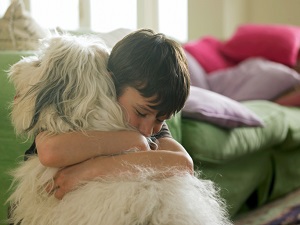 October is Domestic Violence Awareness Month, or a time to begin to understand the effects of domestic violence, which have been researched extensively. Domestic violence is a social problem, affecting each member of a family—including kids, even when they are not the ones directly experiencing violence or aggression. Parents under stress can create children under stress. For children, witnessing domestic violence can lead to the development of many negative behavioral traits or mental health issues. Exposure alone can be traumatic.
October is Domestic Violence Awareness Month, or a time to begin to understand the effects of domestic violence, which have been researched extensively. Domestic violence is a social problem, affecting each member of a family—including kids, even when they are not the ones directly experiencing violence or aggression. Parents under stress can create children under stress. For children, witnessing domestic violence can lead to the development of many negative behavioral traits or mental health issues. Exposure alone can be traumatic.
Children who witness violence in the home are affected in ways similar to children who experience physical abuse. These children are also at a greater risk for both internalized and externalized negative behaviors, which can manifest socially, emotionally, psychologically, and/or behaviorally. Research shows us that boys exhibit more externalizing behavior, like fighting, bullying, lying, and cheating, while girls exhibit more internalized behaviors, such as anxiety, withdrawal, and depression.
In addition to potential problem behaviors, children also may experience psychological ramifications which lead to difficulties in school and lower scores on assessments of verbal, motor, and cognitive skills. Other limitations identified are slower cognitive development, lack of conflict resolution skills, limited problem-solving skills, and even a more rigid belief in gender stereotypes and reinforcement of male privilege.
When parents are engaged in any type of dynamic of domestic violence or aggression, their children can be at an extreme disadvantage when it comes to emotional development. They may tend to show higher levels of anxiety, lower self-esteem, and increased depression and anger. Violence puts a barrier between child and parent, making it difficult for children to develop a nurturing bond with either parent, which in turn can result in extreme anxiety or worry. The children may also display extreme separation anxiety when they go to school or when the parent(s) leaves. Studies show that separation anxiety even takes a physical toll, so children may complain of ailments like stomachache or headache as reasons they cannot go to school.
Exposure to domestic violence can create in the witness a sense of shame, guilt, and self-blame, conflicting feelings about a parent, fear of abandonment, symptoms of depression, and feelings of helplessness and powerlessness. With an increase in stress levels in the home, children can begin bedwetting again, lie to avoid confrontation, and have difficulty trusting others, especially adults. Stress is known to put any immune system in jeopardy—and children are no different. Stress and violence in the home can indirectly result in a short attention span, increased somatic complaints, and frequent illness.
Many children, as a result of exposure to domestic violence, become very secretive about their families and often do not invite friends to the home. They may begin to isolate and detach from the support that they could receive from those around them. Occasionally these behaviors are also linked to developmental delays and difficulty with emotional regulation, so that children feel shame, fear, confusion, and rage, often uncontrollable.
As these children age, it has been found that they also have higher levels of adult depression and trauma symptoms. Their reaction may be to internalize these symptoms, or they may cope with their stress by utilizing drugs or alcohol, fighting rules, ditching school, or running away. When child witnesses to domestic violence start dating, their relationships could have similar negative dynamics to ones their parents or guardians demonstrated. The risk of ending up in a controlling relationship or developing control issues is higher for these individuals.
It is important to note that not all children exposed to domestic violence will experience deficits or cope poorly. Some children demonstrate enormous resiliency and find ways to manage the tension in their homes. They might develop games or withdraw in order to manage the tension. Often they internalize the conflict and it resurfaces much later in life. In my practice, I see children who are high achievers with extreme expectations of themselves, who also have many outside interests, like sports or music. Outside interests and activities keep them out of the home most of the time, and these children tell me that this limits the amount of time that they don’t feel safe and gives them some sense of control in life.
The National Coalition Against Domestic Violence (NCADV) has created a website to help individuals who are in relationships plagued by domestic violence or provide people with resources to help family members and friends who are in abusive relationships.
References:
- Brown, B.V., and Bzostek, S. (2003) Violence in the lives of children. CrossCurrents, 1, Child Trends DataBank
- Edelson, J.L. (2006). Emerging Responses to Children Exposed to Domestic Violence. Harrisburg, PA: VAWnet, a project of the National Resource Center on Domestic Violence/Pennslyvania Coalition Against Domestic Violence. Retrieved 0ct 3, 2013 from michbar.org/publicpolicy/pdfs/Legislators_ResponsesDV.pdf

The preceding article was solely written by the author named above. Any views and opinions expressed are not necessarily shared by GoodTherapy.org. Questions or concerns about the preceding article can be directed to the author or posted as a comment below.

 When Life Isn't Working: Ways to Manage Your Worry
When Life Isn't Working: Ways to Manage Your Worry Domestic Violence in Same-Sex Couples
Domestic Violence in Same-Sex Couples Four Ways to Help Domestic Violence Survivors Without Opening Your Wallet
Four Ways to Help Domestic Violence Survivors Without Opening Your Wallet

